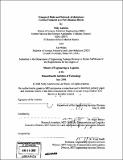| dc.contributor.advisor | Edgar Blanco. | en_US |
| dc.contributor.author | Andrieu, Nelly | en_US |
| dc.contributor.author | Weiss, Lee | en_US |
| dc.contributor.other | Massachusetts Institute of Technology. Engineering Systems Division. | en_US |
| dc.date.accessioned | 2009-04-29T17:15:02Z | |
| dc.date.available | 2009-04-29T17:15:02Z | |
| dc.date.copyright | 2008 | en_US |
| dc.date.issued | 2008 | en_US |
| dc.identifier.uri | http://hdl.handle.net/1721.1/45250 | |
| dc.description | Thesis (M. Eng. in Logistics)--Massachusetts Institute of Technology, Engineering Systems Division, 2008. | en_US |
| dc.description | Includes bibliographical references (leaves 132-133). | en_US |
| dc.description.abstract | This thesis examines the tradeoffs between carbon footprint, cost, time and risk across three case studies of United States' perishable or consumer packaged goods firms and their transportation partners. Building upon previous research, and utilizing an Institute of Management and Administration (IOMA) and MIT Center for Transportation and Logistics (CTL) survey of supply chain professionals, the goal of this thesis is to better understand the decision process and motivations of our case study companies with regard to carbon footprint and implications for transport mode and network architecture, and the tradeoffs involved in making these decisions. We examine: (1) An expedited refrigerated rail service providing coast-to-coast shipment of produce for a major retailer, in lieu of its prior trucking arrangement; (2) A dairy producer which with the help of its trucking partner switched from less-than-truckload (LTL) to full truckload (FTL) and currently explore the possibility to re-organize its distribution network; and (3) A bottled water firm which created an additional container shipping route to reduce the volume of water it ships via truck. Comparisons and contrasts are made between case study firms. Findings from these case studies are used to make forward-looking recommendations for companies interested in altering transport mode and/or network architecture as a means of reducing the carbon footprint of their operations. | en_US |
| dc.description.statementofresponsibility | by Nelly Andrieu and Lee Weiss. | en_US |
| dc.format.extent | 133 leaves | en_US |
| dc.language.iso | eng | en_US |
| dc.publisher | Massachusetts Institute of Technology | en_US |
| dc.rights | M.I.T. theses are protected by
copyright. They may be viewed from this source for any purpose, but
reproduction or distribution in any format is prohibited without written
permission. See provided URL for inquiries about permission. | en_US |
| dc.rights.uri | http://dspace.mit.edu/handle/1721.1/7582 | en_US |
| dc.subject | Engineering Systems Division. | en_US |
| dc.title | Transport mode and network architecture : carbon footprint as a new decision metric | en_US |
| dc.type | Thesis | en_US |
| dc.description.degree | M.Eng.in Logistics | en_US |
| dc.contributor.department | Massachusetts Institute of Technology. Engineering Systems Division | |
| dc.identifier.oclc | 310354586 | en_US |
